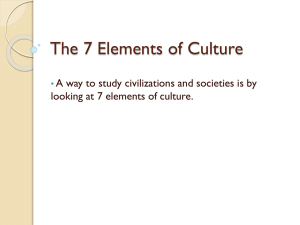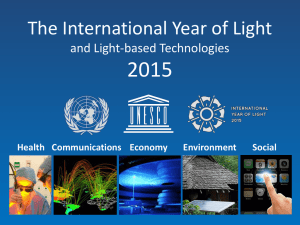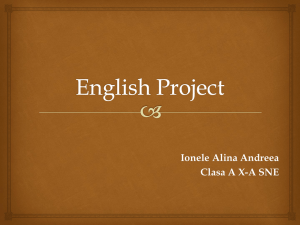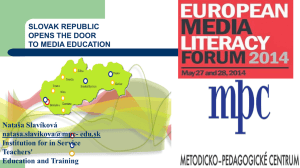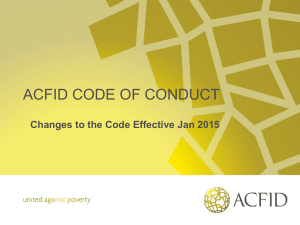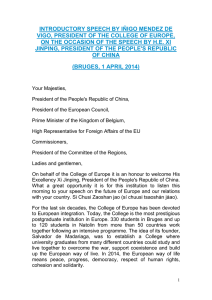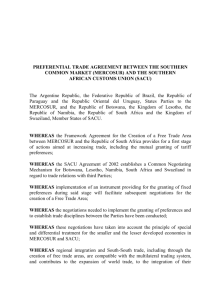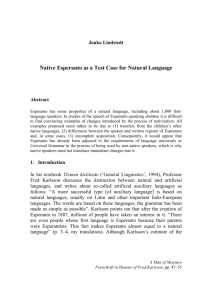chapter ii
advertisement
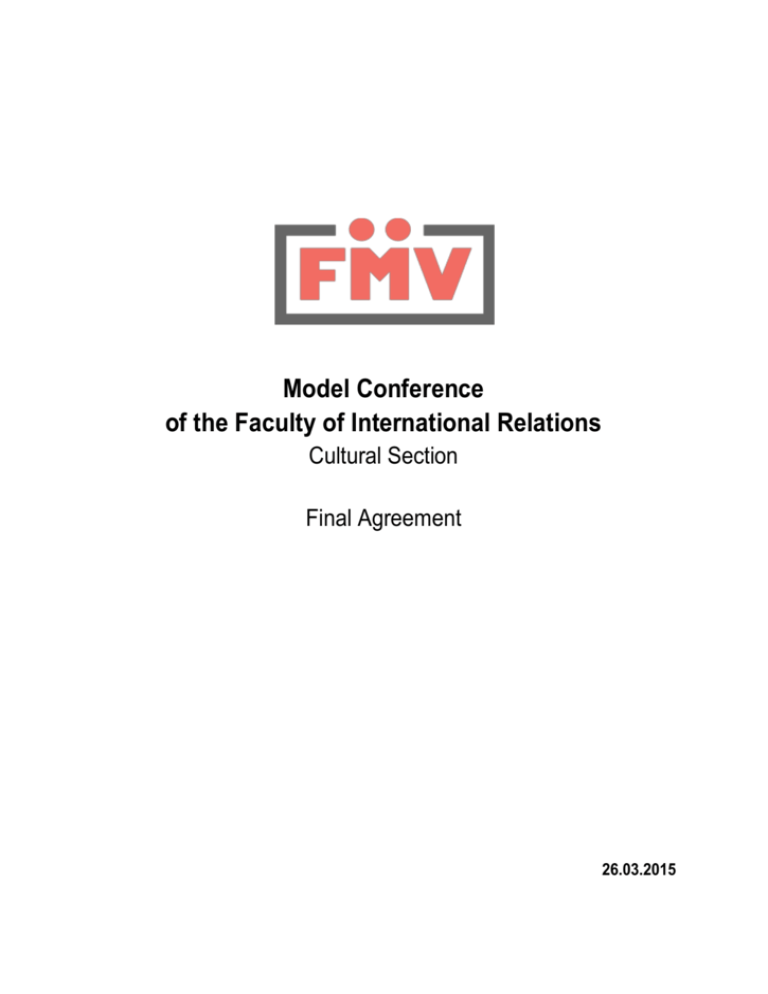
Model Conference of the Faculty of International Relations Cultural Section Final Agreement 26.03.2015 Model Conference of the Faculty of International Relations Cultural Section: Final Agreement Bratislava, 26.3.2015 Model Conference of the Faculty of International Relations on the Language Policy of the European Union PREFACE Regarding the current economic, politic, cultural and development issues of the European Union and its broader milieu, as well as understanding the necessity of finding proper long-term solutions for these issues, we have decided to establish the Model Conference of the Faculty of International Relations as an intergovernmental platform for negotiating and creating consensus among participating states, which are subject to these international challenges and problems. Respecting the main objective of the established platform, the Cultural Section, as a specialized body of the Model Conference, has created a room for multilateral negotiations on the current state and the future advancement of the language policy of the European Union and invited the delegates of the Czech Republic the Federal Republic of Germany the French Republic Hungary the Kingdom of Belgium the Republic of Poland the Slovak Republic the United Kingdom of Great Britain and Northern Ireland as the representatives of all major interest groups of the European Union with different historical, economic, political and other relations in the given context, to take part in the multilateral negotiations and to contribute to the solving of the respective development issues. Unified in the matter of language policy of the EU are hereby affirming their commitment to follow the agreed-upon positions of the agreement to the best of their capacities: recognizing the importance of developing cultural aspect of the EU; supporting the cooperation within further development and creation of the common language policy of the EU; emphasizing the need for further cultural cooperation for more effective system functioning; expressing concern that the reduction of financial expenses represents the progressing effectiveness; acknowledging the need for creating the future systematic projection of the common language policy for all the member states of the EU; welcoming the keen interest and active collaboration of the participating EU member states; supporting the principles of mutual tolerance and long-term cooperation; regarding all aspects and outcomes of the previous sessions of the Cultural Section. -2- Model Conference of the Faculty of International Relations Cultural Section: Final Agreement CHAPTER I PURPOSES AND PRINCIPLES OF THIS AGREEMENT Article 1 Purpose and Principle of Agreement 1. The Agreement of the Cultural Section within Model Conference of the Faculty of International Relations on the Language Policy of the EU (hereinafter referred to as the “Agreement”) represents a consensual agreement and expression of the signatory parties’ opinions and proposals concerning the revision of the current system of the language policy in the European Union (hereinafter referred to as the “EU”). 2. The main purpose of the Agreement consists in the determination of general guidelines for the unification of the language policy on the EU level, which shall be executed with the intention of creating a transparent, efficient and progressive mechanism. 3. The Agreement serves as the basis for further discussions and negotiations concerning the common language policy, which are expected to be held within the official EU level with the presence of all the EU member states. The final agreement shall be presented within the respective EU platforms, with the aim of stimulating further debates and introducing a specific framework of solutions concerning the subject matter. 4. The Vision has a purely recommendatory character and therefore imposes no legally binding obligations on any of the signatory parties or third states, regarding any of the aspects of the determination, execution or evaluation of the EU’s language policy. CHAPTER II Article 1 Trilingualism in Reasonable Period 1. The signatory countries recognize and unanimously confirm the importance of the necessity of the multilingualism within the European Union (hereinafter the “EU”), however, they consider the importance of the effective communication on the institutional level as the essential. 2. Proclaiming the settlement of trilingualism which includes English, German and French languages as the working languages on the institutional level under following conditions: - Trilingualism shall be implemented in the reasonable period, when future development within the language policy of the EU is intended. 3. With regard to the proposed change to the trilingualism on the institutional level, the current multilingualism shall remain on the national level as the cultural heritage of the main principle and citizen´s rights within EU stated in the objectives of the union (...the Union respects cultural and linguistic diversity and ensures that Europe's cultural heritage is safeguarded and enhanced.) -3- Model Conference of the Faculty of International Relations Cultural Section: Final Agreement 4. Respecting the important change in the establishment of trilingualism, the signatory parties agreed on the transition period when trilingualism shall be the principle of communication within the EU institutions. Implementation of trilingualism shall end with the beginning of the new programming period 2020-2021. Article 2 Settlement of Departments 1. Recalling the fundamental rights of the EU: “The inclusion of the Charter in the Constitutional Treaty will make it more visible to all citizens, who will be better informed of their rights. The Charter also contains additional rights not contained in the European Convention for the Protection of Human Rights and Fundamental Freedoms, such as workers' social rights, data protection, bioethics or the right to good administration.“ 2. Understanding the right to good administration, the signatory countries agree on the creation of a language policy contact point in the EU distinguishing between the two institutional systems of translations and interpreting of documents adopted within the institutions of the EU, referred to as: (1) the Language Centre for the EU institutions in Brussels, (2) translation departments within the existing Ministry of Foreign Affairs of the Czech Republic; Federal Foreign Office in the Federal Republic of Germany; The Ministry of Foreign Affairs in the French Republic; Ministry of Foreign Affairs and Trade in Hungary; Foreign Affairs, Foreign Trade and Development Cooperation in Kingdom of Belgium; Ministry of Foreign Affairs in Republic of Poland; Ministry of Foreign and European Affairs of the Slovak Republic; and Foreign and Commonwealth Office in the United Kingdom of Great Britain and Northern Ireland in the member states. 3. Reflecting the institutional needs by the founding Language Centre for the EU institutions in Brussels serving to all the institutions as an advisory and consulting centre. The main objective of the Language Centre is to provide translation and interpreting consulting services for the official representatives of the member countries. 4. Creation of the department within the MFA of every member country which shall be in charge of translations of the officially adopted, signed and generally binding documents of the EU immediately after their adoption specifying in the Chapter II Article III. Article 3 Translation of Documents 1. Regarding the obligatorily translated documents, signatory countries recognize as follows: - legally binding documents of the EU with the exception of suggestions and recommendations of the EU for all the member states; - all documents already adopted, signed and agreed within the EU in their final version. -4- Model Conference of the Faculty of International Relations Cultural Section: Final Agreement Voluntarily translated documents will be translated upon the request of the natural and legal entity existing in the area of the EU. 2. Signatory parties recognize that the allocation of translations of the documents adopted in the EU shall not breach the fundamental rights of the EU citizens. The right for the information shall be remained in the highest effective way. CHAPTER III Article 1 Financial Framework 1. With regard to the proposed changes in the Chapter I., the signatory parties agreed on the financial framework recognizing the current financial situation in the EU. With the aim of the reduction of the costs within the Expenditure Category 5 – Administration, the signatory parties agreed on the division of the current budget for the administration into two parts: (1) Fixed part – expenditures required within trilingualism – translation and interpreting costs in EU institutions; (2) Variable part – expenditures on the national level connected with translations costs which are required by the translations to the official languages of the EU. 2. Being desirous of contributing to the development of functional structure of the financial framework, the working group shall be established with the aim of examining variable part of the budget. The working group shall consist of financial and economy experts with the knowledge of the language policy of the EU. 3. Final outcome of the working group shall be presented to the European Commission and the European Parliament concerning the use of financial sources of the budget and the creation of the prognosis for future periods. Particular data and recommendations shall be published in the official report by 2020. CHAPTER IV Esperanto 1. Signatory parties, aware of the cultural diversity and the uniqueness of their culture and language status, tend to react more protectively regarding the question of implementing trilingualism – English, German and French languages as the leading languages within such a diverse EU. The delegations recognized the Esperanto as the universal, functional and impartial language with propaedeutic signification. 2. Taking into consideration the advices of the Esperantists Union concerning the contribution of Esperanto mainly in the creating of the common language for the whole EU on a non-discriminatory -5- Model Conference of the Faculty of International Relations Cultural Section: Final Agreement level, methods of learning Esperanto and its motivational character for learning other languages, the signatory parties agreed on the system of future assimilation of Esperanto into the EU language policy. 2. Understanding the complexity of implementation of Esperanto within the scheme 1+1+1 in which national, Esperanto and one other language are represented, the signatory parties agreed on the following: a) supporting the cooperation of the representatives of the EU and the World Esperanto Association within the actual procedure of assimilating the Esperanto; b) awaiting fruitful and constructive ideas and solutions resulting from the World Congress of Esperanto taking place in 2016. 3. The negotiations leading to this Agreement have created a strong connection within the V4 countries strongly supporting the role of Esperanto as a possible solution to the complexity of the translations and interpreting within the EU. A common language for the EU shall avoid the preferential status of some languages. The V4 countries express their will to continue in the negotiations on the separate meetings to bring constructive ideas and solutions for future periods in the language policy of the EU. CHAPTER VII Concluding Provisions 1. By singing the Agreement of the language policy of the European Union, the signatory parties commit themselves to support and promote the implementation of the proposed changes within the existing institutional and financial framework of the EU language policy. 2. By signing the Agreement of the language policy of the European Union, the signatory parties declare that their intentions to revise the existing institutional and financial framework of the EU language policy are based on a good faith and a fully independent decision to support the positive development of the cooperation within the respective platforms. 3. This agreement does not represent a detailed, exhaustive framework of responsibilities and competencies of the language policy system and shall be regarded as a general guideline for the purposes stated in the Chapter I. 4. The signatory parties commit themselves to take all necessary steps to successfully initiate further foreseen multilateral negotiations over the subject matter of this agreement. -6- Model Conference of the Faculty of International Relations Cultural Section: Final Agreement The delegations of: Czech Republic Federal Republic of Germany French Republic Hungary Kingdom of Belgium Republic of Poland Slovak Republic United Kingdom of Great Britain and Northern Ireland Bratislava, 26.03.2015 -7-
